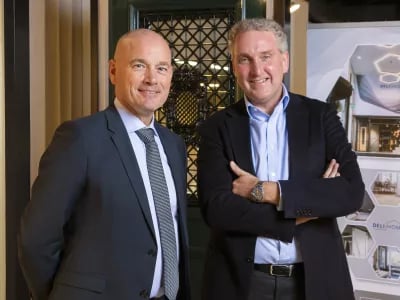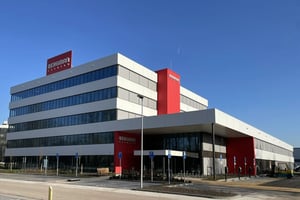CEO Victor Aquina on his company's growth strategy and the Weekamp Deuren acquisition
Deli Home, a manufacturer and distributor of constructive and decorative home products, has ambitious plans to consolidate its market position domestically and internationally, and the recent acquisition of Weekamp Deuren is in line with this strategy. However, the bulk of the growth is to be generated by further expanding the company's customised range of products.
First of all, may we congratulate you on the recent acquisition of Weekamp Deuren?
“Absolutely, since we've already been given the green light by the ACM (Netherlands Authority for Consumers and Markets, the Dutch competition regulator). This takeover is particularly exciting for Deli Home. Our company has already built a strong position in the market for both interior and exterior doors, but the acquisition of Weekamp Deuren will also give us a solid position in the customisation of front doors, back doors and terrace doors, garage doors, interior doors and accessories. In addition, Weekamp also operates its own production facilities in the Czech Republic and Indonesia, so Deli Home and Weekamp are very complementary when it comes to products and services. This means the acquisition makes sense as part of our strategy of international expansion, upscaling, customised solutions and increasing the share of in-house production.”
What type of company is Deli Home?
“Deli Home operates in six different product categories: timber, doors, storage, floors and stairs, and insect screens and sanitary ware. We serve these markets with a number of strong brands, including CanDo, Skantrae, Lundia and Bruynzeel. The product range of these brands is marketed through four channels: major DIY chains, building materials wholesalers and homeware stores. Online is another important sales channel for us, but we always deal with agents – we don't actually sell to consumers directly.”
You mentioned a strategy of international expansion, upscaling, customised solutions and in-house production. Could you explain on that a little?
“Deli Home's growth strategy for the next few years is essentially threefold. First, we plan to do an even better job of exploiting our position as a source supplier: we would like to solidify our position as a reliable partner that develops concepts that help our clients generate strong margins. We will, therefore, be investing even more heavily in in-house production and product development. The second element of our strategy is customised solutions. This is a high-potential market, as there is a growing demand among consumers for customisation. By providing this service through retailers, we will strengthen the position of our dealers and, ultimately, our own position as well. Most of the built-in closets and doors are customised – we do this by using smart online configurators that consumers can use to tailor our products to their own tastes and size preferences. This is all part of our goal to become the ‘digital joinery of the future.’”
That sounds good, but what exactly do you mean by that?
“Let me give you an example. We've been dominant in the DIY market for many years with our CanDo brand, including in stairway renovation products. We will soon also start offering customised CanDo stairway renovations, which consumers can use to take the correct measures and order their product using a short 3D-scan. We will then produce twelve or thirteen steps and send these to consumers including an adhesive, so they can put it all together themselves. This way, we offer consumers the opportunity to order the products they need from us online and have them delivered to their home according to their exact specifications. We plan to further expand this service in the next few years.”
So what is the third element of your growth strategy?
“It's all about increasing our presence in the market, domestically and certainly also internationally. A recent example of this growth trajectory is the acquisition of Weekamp Deuren mentioned earlier. And since we're an NPM Capital portfolio company, there are enough opportunities and possibilities within this type of buy & build strategy.”
What would you say is Deli Home's greatest strength?
“First of all there's the fact that we have no direct competitor with a range as comprehensive as ours. Sure, there's competition out there, but these companies tend to specialise in one of our categories and never in all six of them. This means Deli Home can tailor the different categories to each other, which is something our competitors can't do. Examples of this include customised closets with doors which can be paired with the Skantrae door model series, or stairway renovation products that match with laminate, which allows the floor and the staircase to seamlessly blend in together. We also have a knack for doing things that little bit smarter. A good example is our door warehouse in Zevenaar, the Netherlands, where we're storing 120,000 doors: it has its own processing centre, where we can do all the necessary prep work on the doors. This means the carpenter only needs to finalise work on the doors, as we have already fully customised them.”
Final question: what would you say are some of the main trends for the future?
“Consumers will be looking more than ever for products which are easy to install. They expect retailers or dealers to help them install or assemble their purchase. This is possible at smaller DIY shops, because they tend to employ people who are good at that sort of thing, but major retailers such as Hornbach and Bauhaus also intend to start offering these services. We want to facilitate this service, for example by producing assembly videos. Online configurators will also come to play an even more important role in providing support. Our clients and their end customers can use these tools to very easily calculate and check what they need, and instantly see what kind of product they are ordering. An added benefit is that the configurators operate the machines in our production facility directly.”
Picture: Johan Weekamp (left) and Victor Aquina.
- Read the Deli Home corporate profile



.jpg?width=448&height=200&name=cybersecurity-privacy-protect-data%20(1).jpg)









